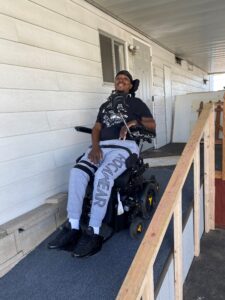Every person with a spinal cord injury tells a different story about their initially overwhelming experience and how they learned to thrive. Those early weeks, post-injury, can be scary, frustrating, and tough, but the adversity can drive some to become advocates and mentors, empowering others to view their lives with fresh inspiration. Regardless of a person’s age, gender, or socioeconomic status, it should be possible—and easier—to find organizations dedicated to providing resources, guidance, activities, and paths to employment and education. The Neilsen Foundation partners with organizations that provide services and programs that help people as they learn about and evolve their new normal to live life with a spinal cord injury (SCI) to its fullest.
Sometimes it can feel like a fight to get the resources that we’d all assume are in place to support people and families following a traumatic injury, but there is support available. In addition to care coordinators helping the newly injured get the medical support they need, mentors with lived experience can share how they have overcome their own struggles, provide resources and tips on returning to life at home and in the community, and offer guidance through difficult times.

Through the Creating Opportunity & Independence portfolio, the Neilsen Foundation makes grants to organizations that provide financial assistance, housing modifications, job skills training, as well as opportunities to reintegrate into one’s community through arts, sports, and recreational programming. The Neilsen Scholarship Program partners with 17 academic institutions, both community colleges and four-year degree programs, to aid students who want to live out their education dreams, often away from home for the first time. Because these programs don’t solve all of the difficulties people face, the Psychosocial Research portfolio funds studies to identify unresolved issues and find new strategies to enhance coping and participation after SCI. Some of this research focuses specifically on disability justice and socioeconomic disparities that limit access to activities and community support for people living with SCI.
Denise Fyffe, the Director of the Health Equity in Disability and Outcomes Research Laboratory at the Kessler Foundation, is hopeful this research will lead to “a better tomorrow” for many low-income, underinsured people with SCI. “One of the studies we are doing, looking at socioeconomic benefits post-injury, has described some of the challenges individuals with SCI face,” she says. “We developed an early intervention program that gets people thinking about employment at the time they’re in the hospital… We have a Vocational Resource Facilitator, who is talking to newly injured individuals about starting or getting back to a career.”
The Rochester Spinal Association has used Foundation support to add a care coordinator to improve the health, wellness, and community integration for people with SCI. Executive Director Chris Hilderbrant explains, “When you have lower socioeconomic status, you just have fewer resources to get by on. In a community where a lot of people may not have graduated high school, some of the concepts around spinal cord injury are just hard to understand. If you don’t have a frame of reference, it puts you at that much more of a disadvantage to understand your own health needs. The support of a coordinator is a huge help.”
A person’s status in society should not limit their opportunities to thrive after a traumatic injury. Through our grantee partners, we want to encourage individuals with SCI to pay forward any help and support they get by taking the information they receive and their experiences and sharing them with the newly injured as counselors and peer mentors. To achieve its mission, the Neilsen Foundation relies on organizations committed to helping these individuals find the best resources, aid, and care.